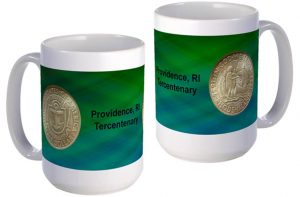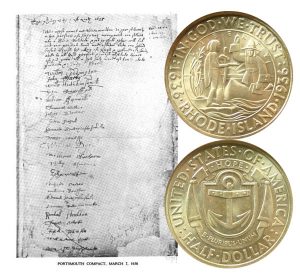 Today, the Rhode Island Commemorative Silver Half Dollar Coin remembers when Dr. John Clarke helped found a settlement and the beginnings of a civil government on March 7, 1638.
Today, the Rhode Island Commemorative Silver Half Dollar Coin remembers when Dr. John Clarke helped found a settlement and the beginnings of a civil government on March 7, 1638.
From The Biographical Cyclopedia of Representative Men of Rhode Island, published in 1881:
=====
Clarke, Rev. John, M.D., the leading man in the settlement of the island of Rhode Island and the city of Newport, and the procurer of the charter of 1663, the third son of Thomas and Rose Clarke, was born October 8, 1609, in Suffolk (some say Bedfordshire), England.
He received a university education, studied medicine, and practiced his profession for a time in London.
He became a Baptist in England. Actuated by a strong love for religious liberty, he came to this country, and settled in Boston, as a physician, in 1637.
He found such “differences ” among the Puritans that, with William Coddington and others, through the influence of Roger Williams, he engaged, March 7, 1638, in the purchase of the island of Aquidneck, where, with his associates, he settled at Pocasset, but, April 28, 1639, with a select few proceeded to settle Newport.
From the first he was a leader in civil and religious affairs, also continued his medical practice there. Very close was his intimacy and agreement with Roger Williams.
A church of a mixed character was begun in Newport, of which he was an elder, but the organization was soon dissolved.
He then proceeded, in 1644, to found the First Baptist Church in Newport, of which he was chosen pastor, and held the pastorate till his death.
He was both Assistant and Treasurer of the Court of Commissioners that met at Warwick in 1649, and also of the same that met at Newport in 1650.
In 1651 he, with Obadiah Holmes and John Crandall, for holding a religious meeting at the house of William Witler, in Lynn, Mass., was arrested, and imprisoned in Boston.
Holmes received thirty lashes with a three-corded whip. Clarke was fined twenty pounds, and Crandall five pounds; and friends paid the fines without their knowledge.
In October, 165 1 , he accompanied Roger Williams, by vote of the colony, to England, to secure the revocation of Coddington’s commission, and to obtain a new and more explicit charter.
Williams returned in 1654, leaving Dr. Clarke the sole agent of the colony; and Clarke wisely managed affairs during the Protectorate and until the new settlement of the monarchy, finally succeeding in securing from Charles II the remarkable charter of 1663, that Rhode Island held as her fundamental law till 1842.
While in England he published two volumes : Ill News from New England ; or, A Narrative of New England’s Persecutions, in 1652; and, Four Proposals to Parliament, and Four Conclusions touching the Faith and Order of the Gospel of Christ, out of his Last Will and Testament.
Returning from England in 1664, he received the thanks of the colony, resumed his pulpit and his medical practice, and was chosen a deputy to the General Assembly.
He served as a Deputy till chosen Deputy Governor.
We soon find him at the head of a commission, next to Roger Williams, for revising the laws of the colony under the new charter.
Among his numerous public engagements, we also find him on a commission for settling the long vexed question of the colony’s western boundary, an affair that excited much ill feeling and led to criminations, but out of which Dr. Clarke came with untainted honor and an enviable reputation.
His versatility of gifts and great strength of judgment are everywhere apparent through his eventful career.
He was chosen Deputy Governor in 1669 and in 1671, having refused the honor in 1670. He married (1) Elizabeth, daughter of John Harges, Esq., of Bedfordshire, England; (2) Mary Fletcher, who died April 19, 1675; (3) Sarah Davis, who survived him.
He had three brothers, Thomas, Joseph, and Carew. From Joseph many of the Clarkes of Rhode Island have descended.
Dr. Clarke died April 20, 1676, in the midst of King Philip’s war, in the sixty-seventh year of his age.
He left, in manuscript, a statement of his religious opinions, from which it is shown that he was a Baptist of the Calvinistic school.
Roger Williams says of him: ” The grand motive which turned the scale of his life was the truth of God — a just liberty to all men’s spirits in spiritual matters, together with the peace and prosperity of the whole colony.”
John Callender, in his valuable “Century Sermon,” says: “No character in New England is of purer fame than John Clarke.”
Hon. Samuel G. Arnold, the historian of Rhode Island, adds: “To him Rhode Island was chiefly indebted for the extension of her territory on each side of the bay, as well as for her royal charter.”
“His life was devoted to the good of others. He was a patriot, a scholar, and a Christian.”
“His blameless, self-sacrificing life disarmed detraction and left him without an enemy.”
Rhode Island owes to him not less than she has paid to Roger Williams, a monument of granite and a statue of bronze; together they founded the colony, and, under God, anchored it fast in hope.
=====
The Rhode Island Commemorative Silver Half Dollar Coin shows with an image of the Portsmouth Compact of March 7, 1638 with John Clarke as the second signature.
